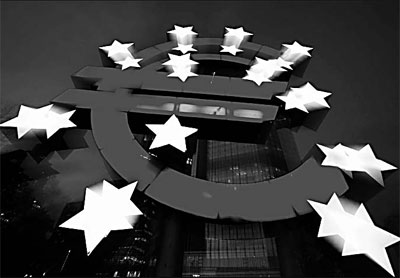

The euro zone economy is starting to feel the heat from nine months of a US-rooted global credit crunch and a soaring euro will crimp exports, but policymakers and business leaders may thank their stars for monetary union.
Ten years after European leaders agreed on May 2, 1998 to launch the euro among 11 member countries, the single currency is near record highs against the dollar and growing as a benchmark reserve currency in central bank coffers worldwide.

But while economists still debate whether the ambitious monetary project has been a success, one of the euro's biggest benefits has probably been realized over the past nine months.
The most obvious casualty of the recent financial upheaval, which was triggered by a bursting of the US housing bubble, has been the US dollar. The buck has plummeted to record lows against world currencies as US interest rates have been slashed.
The subsequent surge of the euro to record highs near $1.60 - up more than 10 percent in the past year - has raised howls of protests from politicians and business leaders across the euro zone about the damage to export competitiveness.
Yet for all that a sky-high euro will crimp regional growth, cast a thought back to the last big dollar crisis to get a sense of the insulation the single currency has provided to Europe's businesses and citizens.
As the United States headed for recession in 1991 after its banking system was rocked by a real estate crisis from the failure of many Savings & Loans firms, the US Federal Reserve slashed rates to shore up the economy and the dollar plummeted.
But the fallout on this side of the Atlantic was dramatic.
The falling dollar prompted a seizure in European financial markets where the semi-fixed European Exchange Rate Mechanism (ERM) that preceded the euro was thrown into convulsions.
"Back then, each time there was a such weakness in the US dollar, it led to a financial crisis in Europe - in essence an exchange rate crises," says Eric Chaney, European economist at Morgan Stanley.
"We can't and shouldn't rewrite history, but it would have happened again and it would have forced some central banks to raise rates to protect currency pegs and some would have given up altogether. In short, it would have been chaotic."
As the dollar plummeted to record lows around 1.45 marks early in 1991, investors fleeing dollars flocked to the old German mark and German government bonds.
In those days, the mark tended to act as a safe-haven from peripheral European markets like Italy, Spain, Greece and even Belgium in times of financial or political stress. The Bundesbank's anti-inflation credentials enhanced the mark's status as a store of value.
And in 1991 the mark was also supercharged as Bundesbank pushed interest rates higher to offset the inflationary side-effects of German reunification.
With many countries, such as Britain and Italy, out of synch with Germany's sudden boom, doubts rose about whether they could afford to keep their currencies in step with the soaring mark - as ERM rules required them to do.
Those doubts quickly sowed a vicious cycle of capital flight, interest rate rises to protect currency pegs and eventual devaluations when the cost of high rates became unbearable.
Sterling and the Italian lira were ejected from the ERM in September 1992 and a series of devaluations from Spain to Ireland followed. Repeated speculative attacks on the French franc's peg to the German mark, meantime, was a feature of the crisis through early 1993.
The dollar slide created monetary maelstrom in Europe and a level of exchange rate and interest rate volatility that exacted a heavy tax on cross-border business planning and investment.
And given that more than half of all euro zone exports are to other euro zone countries, the absence of that kind disruption this time around has been significant .
"Uncertainty about currencies is a major uncertainty about future profits and once companies take that uncertainty on board they react very quickly - and that reaction is to first cut back on capex and then on jobs," says Chaney at Morgan Stanley.
Given that backdrop, it is not difficult to see how the last nine months might have played out in terms of financial speculation.
As inflated housing markets fell everywhere and Britain's Northern Rock suffered a bank run, sterling lost over 10 percent against a basket of world currencies between November last year and March and set record lows against the euro.
What would have happened to the currencies of other housing-exposed economies such as Spain and Ireland if there had not been monetary union? Would they have allowed the depreciation or resisted it with interest rate rises?
How would financial markets have reacted to the rogue trader incident at Societe Generale in January in the middle of it all?
How would the 15 central banks of the current euro zone have coordinated the massive money market intervention at the core of the European Central Bank's crisis management?
Hypothetical questions will never have firm answers but the precedents do suggest a lot of problems have been avoided.
That said, there are also those who say that while the euro may have been a shield against short-term financial volatility and is superior to the ERM structure, a system of freely floating exchange rates would have allowed differing regional impacts to be absorbed in different ways.
Britain, outside the euro zone, is better equipped to deal with the crisis with a lower pound and Bank of England rate cuts, they argue.
"The euro has short circuited the financial market volatility and that's clearly a good thing - certainly better than the ERM," says Joe Prendergast at Credit Suisse in Zurich.
"But there's still a reasonable question about whether a system of fully floating exchange rates could have operated better and whether the euro prevents certain regions adjusting to asymmetric shocks."
Agencies
(China Daily 05/12/2008 page11)













